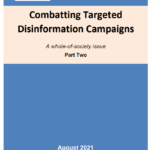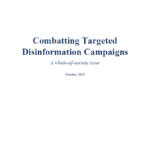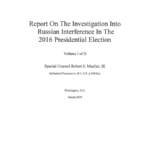
Recent events have demonstrated that targeted disinformation campaigns can have consequences that impact the lives and safety of information consumers. On social media platforms and in messaging apps, disinformation spread like a virus, infecting information consumers with contempt for democratic norms and intolerance of the views and actions of others. These events have highlighted the deep political and social divisions within the United States. Disinformation helped to ignite long-simmering anger, frustration, and resentment, resulting, at times, in acts of violence and other unlawful behavior.


